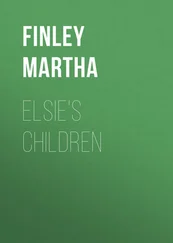He paused, and there was a moment of profound silence.
"Who was nearest to Elsie when she fell?" he asked; "can any one tell me?"
"Arthur, sir," replied several voices.
Another pause.
"Who else was near her?" he asked. "Miss Carrie Howard, I have noticed that you and Elsie are usually together; can you tell me if she could have fallen of herself? Were you near enough to see?"
Carrie answered reluctantly: "Yes, sir; I had stepped from her side at the moment she stooped to pick up something, and feel quite certain that she was not near enough to the edge to have fallen of herself."
"Thank you for your frank reply. And now, Master Harry Carrington, I think I heard some one say you were quite close to Arthur at the time of Elsie's fall; can you tell me what he did to her? You will confer a great favor by answering with equal frankness."
"I would much rather have been excused from saying anything, sir," replied Harry, coloring and looking as if he wished himself a thousand miles away; "but since you request it, I will own that I was close to Arthur, and think he must have pushed Elsie in springing past her, but it may have been only an accident."
"I fear not," said the old gentleman, looking sternly at his son. "And now, does any one know that Elsie had vexed Arthur in any way, or that he had any unkind feelings toward her?"
"Yes, papa," Walter spoke up suddenly. "I heard Arthur, the other day, talking very crossly about Elsie, and threatening to pay her for something; but I didn't understand what."
Mr. Dinsmore's frown was growing darker, and Arthur began to tremble and turn pale. He darted a fierce glance at Walter, but the little fellow did not see it.
"Does any one know what Elsie had done?" was the next question.
No one spoke, and Herbert fidgeted and grew very pale. Mr. Horace Dinsmore noticed it, and begged him if he knew anything to tell it at once; and Herbert reluctantly repeated what he had already told his mother of the conversation in the woods; and as he concluded, Lora drew a note from her pocket, which she handed to her father, saying that she had picked it up in the school-room, from a pile of rubbish which Arthur had carelessly thrown out of his desk.
Mr. Dinsmore took it, glanced hastily over the contents, and with a groan, exclaimed: "Is it possible!—a gambler already! Arthur, has it really come to this?
"Go to your room, sir," he added, sternly, "there to remain in solitary confinement until arrangement can be made to send you to school at a distance from the home which shall be no longer polluted by your presence; for you are unworthy to mingle with the rest of the family."
Arthur obeyed in sullen silence, and his father, following, turned the key upon him, and left him to solitude and his own reflections.
"Did my little daughter think papa had quite forgotten his promise?" asked Mr. Horace Dinsmore, as again he stood by Elsie's couch.
"No, papa," she said, raising her eyes to his face with a grateful, loving look; "it seemed very long, but I knew you would come as soon as you could, for I know you never break your word."
Her confidence pleased him very much, and with a very gratified look he asked whether he should sit by her side or take her again upon his knee.
"Take me on your knee again, if you please, papa," she said, "and then will you read a little to me? I would like it so much."
"I will do anything that will give my little girl pleasure," he replied, as he once more lifted her gently, and placed her in the desired position.
"What shall the book be?" he asked; "one of the new ones I bought you the other day?"
"Not that, to-night; if you please, papa; I would rather hear a little from an old book," she answered, with a sweet smile lighting tip her little pale face; "won't you please read me the fifty-third chapter of Isaiah?"
"If you wish it, dearest; but I think something lively would be much better; more likely to cheer you up."
"No, dear papa; there is nothing cheers me up like the Bible, it is so sweet and comforting. I do so love to hear of Jesus, how he bore our griefs and carried our sorrows."
"You are a strange child," he said, "but you shall have whatever you want to-night. Hand me that Bible, Aunt Chloe, and set the light a little nearer."
Mr. Dinsmore was an uncommonly fine reader, and Elsie lay listening to that beautiful passage of Holy Writ, as one might listen to strains of the softest, sweetest music.
"Now, dear papa, the twenty-third of Luke, if you please," she said, when he had finished.
He turned to it, and read it without any remark.
As he closed the book and laid it aside, he saw that tears were trembling on the long, silken lashes that rested on the fair young cheek; for her eyes were closed, and but for those tell-tale drops he would have thought her sleeping.
"I feared it would make you sad, darling," he said, brushing them away, and kissing her fondly.
"No, dear papa, oh, no !" she answered, earnestly; "thank you very much for reading it; it has made me feel a great deal better."
"Why did you select those particular passages?" he asked, with some curiosity.
"Because, papa, they are all about Jesus, and tell how meekly and patiently he bore sorrow and suffering. Oh, papa, if I could only be like him! I am not much like him, but it makes it easier to forgive and to be patient, and kind, and gentle, when we read about him, how good he was, and how he forgave his murderers."
"You are thinking of Arthur," he said. " I shall find it very hard to forgive him; can you do so?"
"Yes, papa, I think I can. I have been praying for him, and have asked God to help me to forgive and love him."
"He has treated you very badly; I know all about it now."
And then, in answer to her surprised, inquiring look, he proceeded to give her an account of all that had taken place that evening in the library and drawing-room.
"And he hates me, papa," she said, mournfully, the tears filling her eyes; "why should he feel so? I have always tried to be kind to him."
"Yes, I know it," he replied, "you have often done him kindnesses, and I know of no other cause for his enmity, unless it is that you have sometimes been obliged to bear witness against him."
"Yes, papa, on several occasions when he was putting all the blame of his naughty deeds on little Walter, or poor Jim."
"You were perfectly right," he said, caressing her; "and he will not have another opportunity to vent his spite upon you, as he is to be sent away to boarding-school immediately."
"Oh, papa!" she exclaimed, "I am so sorry for him, poor fellow! It must be so dismal to go off alone among strangers. Dear papa, do ask grandpa to forgive him, just this once; and I don't believe he will ever behave so again."
"No, daughter, I shall not do anything of the kind," he answered, decidedly. "I think it will be for Arthur's own good to be sent away, where he will not have his mother to spoil him by indulgence; and besides, I cannot feel that you are safe while he is about the house, and I consider it my first duty to take care of you; therefore, I have insisted upon its that either he must be sent away, or you and I must go and make a home for ourselves somewhere else."
"Oh, papa, how delightful that would be, to have a home of our own!" she exclaimed eagerly; " will you do it some day?"
"Should you like it so much?" he asked.
"Oh, yes, papa, so very, very much! When will you do it, papa?"
"I don't know, darling; some day, if we both live; perhaps when you are old enough to be my housekeeper."
"But that will be such a long, long time to wait, papa," she said—the eager, joyous expression fading away from her face, and the pale, wearied look coming back again.
Читать дальше












